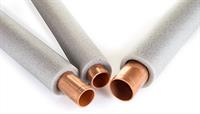
Winter’s bite can play havoc with household plumbing. And though we don’t like to think about it, fall is when you should be preparing your home for the frosty months.
At the very least, frozen water pipes may mean a missed morning shower while pipes thaw out. At worst, costly damage and repairs. Here are some tips, so you don’t wake up to frozen pipes this winter.
Before Freezing Weather
- Familiarize yourself and everyone in your household as to the location of the main water shut-off valve. Finding and closing this valve is the first step in any type of water emergency. The valve is normally located where water first enters the home from the street, and often near the water heater or washing machine.
- Insulate pipes and faucets in unheated areas, such as garage, crawl space, or attic. The closer a pipe is to the ground or outside walls, the more likelihood of freezing. Your local home improvement store can recommend the best materials and methods.
- Outside faucets should have inside shut-off valves installed. These are normally found in basements and crawl spaces. These should be shut, and the outside faucet left open to drain. If your home doesn’t have outside faucet shut-off valves, then wrap each faucet with insulation. Disconnect and drain all hoses before storage.
- Turn off and drain irrigation systems and backflow devices. Wrap backflow devices with insulating material. If in doubt, consult a qualified plumber or lawncare professional.
- Swimming pools and spas require special attention and can vary considerably in their design and winterizing requirements. If you’re not familiar with yours, consult a pool specialist.
- Cover foundation vents with foam blocks, thickly folded newspaper, or cardboard to maintain higher temperatures in unheated areas.
- Visit the Natural Resources Canada Energy Efficiency website to learn how to make your home more energy efficient. You’ll not only protect your plumbing, but you’ll save money and be more comfortable too.
Working on your home’s plumbing requires specialized knowledge, as well as the proper tools and supplies. If you have any doubts about your DIY abilities, you should entrust this work to a qualified plumber.